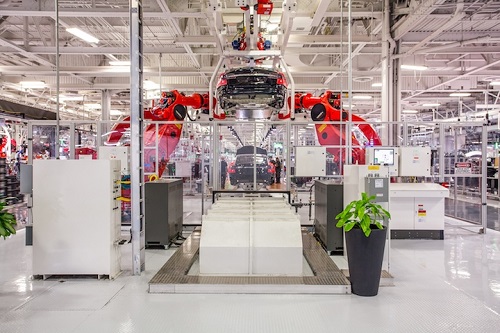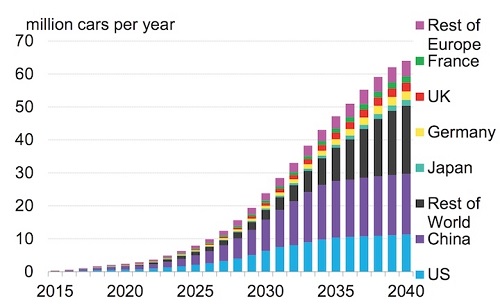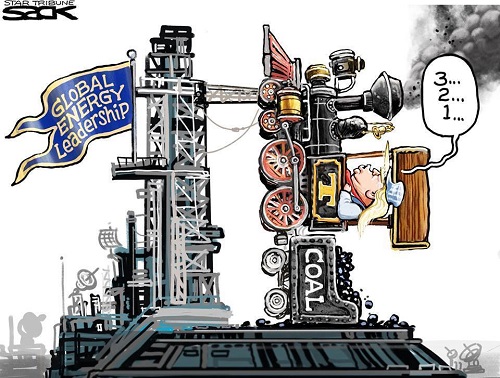2017 SkS Weekly Climate Change & Global Warming Digest #27
Posted on 9 July 2017 by John Hartz
Story of the Week... Toon of the Week... SkS Spotlights... Coming Soon on SkS... Poster of the Week... Climate Feedback Reviews... SkS Week in Review... 97 Hours of Consensus...
Story of the Week...
The World Is on the Brink of an Electric Car Revolution
The internal combustion engine had a good run. It has helped propel cars — and thus humanity — forward for more than 100 years.
But a sea change is afoot that is forecast to kick gas-powered vehicles to the curb, replacing them with cars that run on batteries. A flurry of news this week underscores just how rapidly that change could happen.

Robots at the Tesla factory in Fremont, Calif. put together electric cars. Credit: Tesla Motors
A quick recap: On Monday, Tesla announced that the Model 3, its mass-market electric car, would start rolling off production lines this week with the first handful delivered to customers later this month. Then on Wednesday, Volvo announced that every car it produces will have a battery in it by 2019, putting it at the forefront of major car manufacturers. Then came France’s announcement on Thursday that it would ban the sale of gas-powered cars by 2040.
All this news dropped just in time for Bloomberg New Energy Finance’s latest electric car report, which lays out why electric cars are the way of the future and when they’re projected to take over the market. The authors said although electric vehicles are currently a tiny fraction of the car market, that market could reach an inflection point sometime between 2025-2030. After that, electric car sales are slated to increase rapidly.
Driven by the falling cost of batteries and the growing number of automakers producing a wider variety of electric cars, Bloomberg NEF expects that electric cars will account for 54 percent of all car sales globally by 2040. That’s a huge uptick from its forecast last year of electric vehicles accounting for 35 percent of all sales.
The shift to electric vehicles will disrupt the fossil fuel industry. The 530 million total electric cars forecast to be on the road by 2040 will require 8 million fewer barrels of oil a day to run.

A new forecast for electric cars shows explosive growth in new sales, particularly in China.
Credit: Bloomberg NEF
One of the big pitches for electric cars is their positive benefit for the climate because they reduce the use of oil. But they will require a lot more power from the electric grid. Energy use from electric vehicles is expected to rise 300 times above current demand, putting more strain on power generation.
How that energy is produced will go a long ways toward determining how climate-friendly electric cars actually are. A recent Climate Central analysis looked at all 50 states and found that the energy mix was clean enough in 37 of them to ensure electric cars are more climate friendly than their most fuel-efficient combustion engine counterparts.
That’s a sharp uptick from a 2013 analysis, which found that there were just 13 states where electric cars were cleaner than gas-powered ones, and it’s driven in large part by a precipitous drop in coal use.
While the U.S. is projected to be one of the biggest drivers of the electric vehicle revolution, China and the European Union will also be major players. By 2025, Bloomberg NEF’s projections show that China will be the biggest buyer of electric vehicles in the world, a trend that continues through 2040.
That means how China’s energy mix develops will be one of the most important factors to determining how climate friendly all the new electric vehicles on the road will be.
The World Is on the Brink of an Electric Car Revolution by Brian Kahn, Climate Central, July 6, 2017
Toon of the Week...

SkS Spotlights...
ReliefWeb is the leading humanitarian information source on global crises and disasters. It is a specialized digital service of the UN Office for the Coordination of Humanitarian Affairs (OCHA).
We provide reliable and timely information, enabling humanitarian workers to make informed decisions and to plan effective response. We collect and deliver key information, including the latest reports, maps and infographics and videos from trusted sources.
ReliefWeb is also a valuable resource for job listings and training programs, helping humanitarians build new skills and discover exciting new career opportunities.
Coming Soon on SkS...
- 2017 SkS Weekly Climate Change & Global Waming Digest #27 (John Hartz)
- Conservatives are again denying the existence of global warming (Dana)
- Those 80 graphs that only show evidence of climate myths (Ari Jokimaki)
- Explainer: Dealing with the ‘loss and damage’ caused by climate change (Carbon Brief)
- Republicans want to use taxpayer dollars to fund climate science losers (John Abraham)
- ClimateChats: Climate Pictures (Adam Levy)
- 2017 SkS Weekly Climate Change & Global Warming News Roundup #28 (John Hartz)
Poster of the Week...

Climate Feedback Reviews...
Climate Feedback asked its network of scientists to review The American South Will Bear the Worst of Climate Change’s Costs by Robinson Meyer, The Atlantic, June 29, 2017
Three scientists analyzed the article and estimated its overall scientific credibility to be ‘high’. A majority of reviewers tagged the article as: Accurate
Click here to acess the entire review.
SkS Week in Review...
- 2017 SkS Weekly Climate Change & Global Warming News Roundup #27 by John Hartz
- Mapped: How climate change affects extreme weather around the world by Roz Pidcock & Rosamund Pearce (Carbon Brief)
- Why the Republican Party's climate policy obstruction is indefensible by Dana Nuccitelli (Climate Consensus - the 97%, Guardian)
- Planet Hacks: Flying by Climate Adam
- Bad news for climate contrarians – 'the best data we have' just got hotter by John Abraham (Climate Consensus - the 97%, Guardian)
- 2017 SkS Weekly Climate Change & Global Warming Digest #26 by John Hartz
97 Hours of Consensus...
































 Arguments
Arguments






























Electric cars are clearly the way of the future, with so many upsides and no real downsides. Even Trump might buy one, if it's painted gold.
I understand the world has pretty large reserves of lithium, but its not an infinite resource, so are there other workable possible battery technologies as well?
I'm pretty sure the Lithium in batteries is not 'used up' from the charge/discharge cycle. Old batteries, filled with micro-shorts and other forms of oxidation stress, can be melted down and reduced again into new batteries. Likewise old Silicon in solar cells.
There is actually a fairly robust lithium battery recycling industry despite the low cost of new supplies. Thus, if stocks ever ran low that would drive up prices and lead to more recycling. The same is true for many key materials that people worry about 'running out' of.
In theory we could even pull carbon out of the atmosphere to create new hydrocarbon fuels... there just isn't any currently cost effective way to do so.
I'm surprised to read some of the comments about lithium recycling.
"ubrew" mentions melting down old batteries, presumably to reclaim lithium. I have only been able to find references to furnacves for reclamation of cobalt, coupled with mention of waste slag that contains a mixture of elements, not all of them pleasant. So far I have only been able to locate one such commercial operation, in Belgium. I have seen mention of another, unnamed, operation in the States.
CBDunkerson refers to a "robust lithium battery recycling industry" which I would like to know more about. It seems that even the EU has no firm plans along these lines.
Of course there are a number of bench prototypes and proposals floating around, but there are also many types of lithium battery, each with differing design, many of which are particularly fiddly and each needing a degree of disassembly before recycling (or partial recyclong). I have read that recycling of lithium from batteries is a very difficult proposition and is thus at least a decade away at practical scale.
That leaves three questions:
1. Where is there evidence of a robust lithium recycling industry?
2. Is recycling of lithium currently energy-competitive with sourcing lithium from minerals? Restraints? Pre-conditions?
3. Is recycling lithium from batteries currently economic? If so, where and under what circumstances?
These are not trivial considerations. Any person who proposes a reliance on lithium based batteries must be prepared to ensure that the necessary lithium and other raw materials are or will be realistically available and affordable. Proposals are for future billions of motor vehicles plus super-batteries providing stability to networks. Our current mobile phones and power tools are meerly scratching the surface.
IMHO, lithium batteries and solar PV panels are destined to become landfill, unwelcome in recyclers' waste streams, for some time to come.
I'm no expert, but you can melt down sand, reduce it (take out the oxygen) and crystallize it into Silicon solar cells. Eventually, those fail as their contacts short out and from re-oxidation. It doesn't seem a stretch to imagine re-reducing the cell, separating out the contacts from the Silicon, and recrystallizing the Silicon, but again, I'm no expert. It's like recycling Aluminum cans. You can make the cans from bauxite, but its easier to remelt the cans themselves and recast them.
These things aren't nonrenewable the way burning gasoline is nonrenewable.
SingletonEngineer@4,
I share your concern that the current economic games driven by popularity and profitability without restrictions that ensure that only truly sustainable activity is allowed to compete to win will fail to care to recycle lithium-ion batteries.
There are many information sources but the following pair seem to be fairly comprehensive:
Lithium can be recovered from the slag for reuse. It is just that because full recycling of non-renewable resources is not required the cost of extracting the lithium for reuse is about 5 times the cost of new lithium.
The problem is not the technology. The problem is it the lack of leadership (by all of the wealthy and powerful leaders/winners of the games) to ensure that only truly sustainable activity gets to compete for popularity and profitability.
CBDunkerson@3, ubrew12@5,
With my imagination, I think the cost (~energy input required) of reducing oxydated compounds to their elements - Si or Al or C in CO2! - depends on the amount of oxidation that you have to reduce.
The first example you give: cost of re-reducing recycled (=slightly contaminated) Al cans, involves just removing paint contaminant. Compared to bauxite processing, which involves large amounts of electricity for electrolysis to separate Al from Al2O3, the energy input is almost nothing and the benefit recycling an abvious no-brainer.
The second example: Si re-reducing from used solar panels - I'm not sure how much oxydation is there and if the process would be much different to melting down sand. I welcome material engineers to shed some light here.
The third example - scraping carbon out of the CO2 in atmosphere - is a pure fantasy: so much oxidation, needless to say CO2 dillution down to 0.04%, is to overcome. On top of that we're talking about convincing science deniers to use precious energy for nothing but influence some "invisible trace gas", while they want all available energy for themselves and don't care about said gas. Very hard, next to impossible, unless future technology miraculously delivers unlimitted free clean energy (nuke fusion proponents tried to market it as such but failed).
Chriskoz,
The US Navy has already made jet fuel from CO2 recovered from sea water. They estimate the cost at about US$3-6 per gallon. It is not clear from the article if they have to pay for the electricity they use to run the process. If renewable energy was cheap enough you could make jet (or automobile) fuel but the efficiency of the process is low (internal combustion engines are only about 30% efficient while electric motors are over 90% efficient). In addition, internal combustion motors are high polluting compared to electric if you ike clean air to breathe.
This is modern technology, not a miracle.